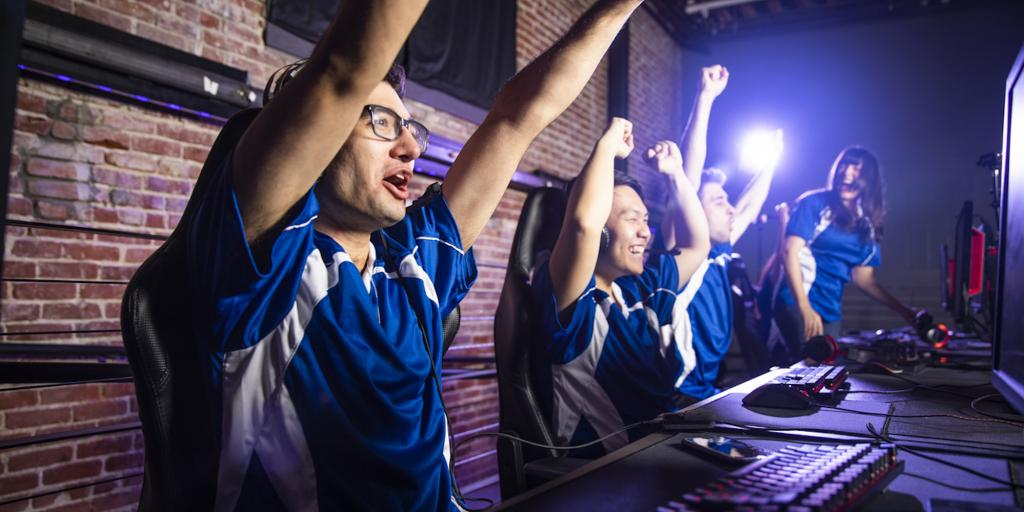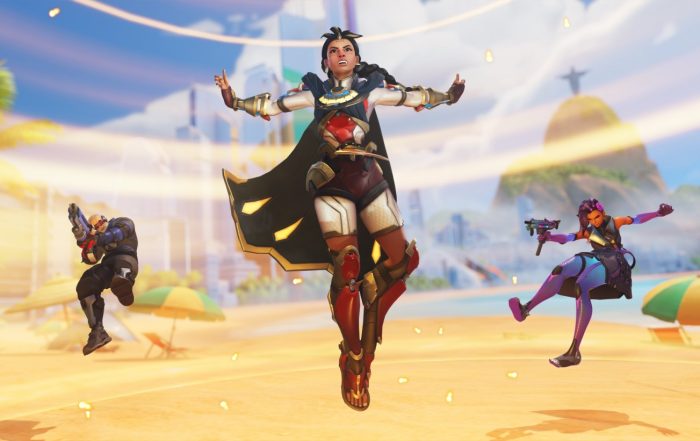Benefits Of Esports For Children
Key Takeaways
- Esports boosts strategic thinking and fosters problem-solving skills in children.
- Participation in esports enhances communication and develops hand-eye coordination.
- Esports can improve spatial awareness, crucial for navigating complex environments in games.
- Engaging in esports can be a fun and rewarding activity, provided it is balanced with other healthy activities.
Esports, or electronic sports, have seen a surge in popularity over recent years. While the concept of competitive video gaming might seem like all fun and games, there are significant benefits of esports for children. Beyond the digital realm, esports can help children develop essential cognitive and social skills that can be applied in real-world scenarios. Let’s delve into how esports can boost strategic thinking, enhance communication, improve spatial awareness and hand-eye coordination among children.
 Enhancing Cognitive and Social Skills through Esports
Enhancing Cognitive and Social Skills through Esports
One of the notable benefits of esports for children is the enhancement of strategic thinking. Esports games often require players to make quick decisions under pressure. This fosters problem-solving skills as children have to strategize and plan their moves to win the game. It’s not just about hitting the buttons faster; it’s about thinking two steps ahead of your opponent and adapting to ever-changing game scenarios.
Communication, a vital life skill, also gets a significant boost with esports. Team-based games require players to coordinate strategies and share information with their teammates. This encourages children to communicate effectively and work as part of a team, skills they will need in their professional lives.
Esports can also enhance children’s spatial awareness. This cognitive skill is crucial in many games where players need to navigate complex environments or keep track of multiple objects. Spatial awareness in gaming can translate to an improved ability to process and interpret visual information in real-life situations.
Hand-eye coordination is another skill that esports help develop in children. Fast-paced, action-oriented games require players to respond quickly to visual stimuli using hand movements. This skill is not only beneficial for gaming but also for activities like sports and even everyday tasks.
As noted by Kinzoo, esports can indeed be a fun and rewarding activity for kids, provided they maintain a balance with other healthy activities. The benefits of esports for children extend beyond the gaming world, helping them develop cognitive skills like spatial awareness, problem-solving, decision-making, and more. Moreover, it helps them learn teamwork and effective communication, preparing them for future real-world scenarios.
 Benefits of Esports as a Pathway to College Scholarships
Benefits of Esports as a Pathway to College Scholarships
The benefits of esports for children extend beyond cognitive and social skills development. A significant trend that has been gaining momentum is the provision of esports scholarships by colleges. According to Wyoming Soccer, there are over 280 colleges today that feature esports scholarship programs. These programs operate similarly to traditional ones, sometimes even being managed by the college’s athletic department. For many students, leaning into esports can become a realistic opportunity to gain valuable scholarships for college.
Opening New Opportunities
Participation in esports can open new doors for students. Not only does it enhance their cognitive and social skills, but it also provides a platform for them to secure scholarships and actively participate in school activities. The esports industry’s growth has led to the creation of numerous opportunities for students to showcase their gaming skills and earn recognition in the form of scholarships.
Earning a College Scholarship Through Esports
The process of earning a college scholarship through esports is similar to that of traditional sports. It involves demonstrating exceptional skills, participating in tournaments, and maintaining a certain level of academic performance. The requirements may vary depending on the college and the specific esports program. However, the potential benefits are significant, including financial aid for college education and an entry into the thriving esports industry.
Long-term Benefits of Esports Scholarships
Securing an esports scholarship has long-term benefits. It reduces the financial burden of college education, allowing students to focus more on their studies and less on financial concerns. Additionally, it opens doors to further opportunities in the esports industry. From becoming a professional esports player to working in game development or esports event management, the options are plentiful. Being part of a college’s esports program also gives students access to high-quality training facilities and coaching, providing them with a solid foundation to excel in the competitive world of esports.
In a world where traditional sports scholarships are limited, esports emerges as a promising alternative. The benefits of esports for children are numerous, offering them a chance to develop essential skills while also providing a pathway to valuable college scholarships.
 Esports and the Development of Teamwork Skills
Esports and the Development of Teamwork Skills
One of the key benefits of esports for children is the development of teamwork skills. Most esports games require players to work together to achieve common goals. This collaborative environment encourages teamwork, promoting a set of skills that are highly valuable in real-world situations.
Encouraging Teamwork
Esports games often involve teams of players working together to overcome challenges and defeat their opponents. This requires players to coordinate their actions, communicate effectively, and support each other. The need for collaboration in these games mirrors the kind of teamwork required in professional environments, making esports a practical avenue for children to develop these essential skills.
Effective Communication and Coordination
Effective communication and coordination are vital in esports. Players must share information, discuss strategies, and coordinate their actions to succeed. These skills are not only relevant in the gaming world; they are also highly sought after in various professional fields. The experience gained from participating in esports can help children develop these skills early on, giving them a competitive edge in their future careers.
Promoting Inclusivity and Camaraderie
Participation in esports fosters a sense of community among students. The inclusive nature of esports allows all students with an interest and enthusiasm for gaming to participate. As mentioned by Intel, school-sponsored esports have an equitable and inclusive nature, encouraging camaraderie and a sense of belonging among students.
Teaching Sportsmanship
Esports also provides a platform for children to learn about dealing with victory and defeat, teaching them the importance of sportsmanship. It’s not always about winning; it’s about how you handle the result, whether it’s a win or a loss. Esports teaches children about perseverance, resilience, and respect for their opponents—lessons that will serve them well in all aspects of life.
From building teamwork skills to promoting sportsmanship, the benefits of esports for children are indeed multifaceted. As esports continues to grow in popularity, more and more children will have the opportunity to reap these benefits and develop essential skills that will serve them well in the future. At Esports Tower we stand by a set of codes that govern our coaching program. Breaches in sportsmanship are seen as ‘teachable moments’ helping players grow their resilience.
The Benefits of Esports in Fostering Problem-Solving Skills
Esports, with its intricate gameplay and complex mechanics, presents an environment where children can develop problem-solving skills. This aspect of esports offers another layer to the benefits of esports for children.
Developing Problem-Solving Skills
Esports games are filled with complex challenges that require creative solutions. Players are often faced with unique situations that demand strategic thinking and quick decision-making. These problem-solving skills can be honed through regular participation in esports, making it an effective tool in preparing children for future academic and professional challenges.
Benefits in Academic and Professional Settings
The problem-solving skills developed in esports are beneficial beyond the gaming world. These skills are highly valued in academic and professional settings. Whether it’s finding an innovative solution to a mathematical problem or developing a strategic plan in a business scenario, these skills can significantly contribute to a child’s overall academic performance and future professional success.
Strategic Thinking in Esports
Strategic thinking plays a significant role in esports. It involves planning, foresight, and the ability to adapt to changing situations. Players need to anticipate their opponents’ moves, adapt their strategies in response to new challenges, and make split-second decisions under pressure. This level of strategic thinking is not only crucial in esports but also in real-world scenarios where adaptability and foresight are key to success.
Improving Ability to Think on Their Feet
Esports provides a fast-paced environment that demands quick thinking and adaptability. Players must make decisions in real-time, often under intense pressure. This helps improve their ability to think on their feet, a skill that is valuable in many real-world scenarios. Whether it’s responding to a sudden change in a project at work or quickly adapting to a new situation in daily life, the ability to think on one’s feet is a crucial skill in today’s fast-paced world.
From developing problem-solving skills to improving the ability to think on their feet, esports provides a platform for children to hone these valuable skills in a fun and engaging environment. In life managing your emotions is an important skill. Esports helps children prepare for modern stresses and become more adaptable.
 Esports and the Promotion of Healthy Competition
Esports and the Promotion of Healthy Competition
Esports is not just about entertainment—it’s also about cultivating a sense of healthy competition. This aspect of esports is vital in discussing the benefits of esports for children.
Encouraging Healthy Competition
Esports promotes a spirit of healthy competition, encouraging players to strive for constant improvement and mastery in their chosen games. This competitive environment, while enjoyable, also pushes children to set personal goals and work towards achieving them—a skill that’s crucial in all aspects of life.
Benefits Beyond Gaming
The competitive spirit fostered in esports can be beneficial in other areas of life, such as academics or other extracurricular activities. Children who engage in esports often develop a drive to excel—not just in their games, but also in their studies and other pursuits. They learn to embrace challenges, strive for excellence, and persist in the face of obstacles. This attitude can make a significant difference in their academic performance and future professional endeavors.
Maintaining Balance in Esports
While healthy competition is a positive aspect of esports, it’s also important to maintain a balance with other activities. Esports should not become the sole focus of a child’s life; instead, it should be one of several avenues for growth and development. This balance ensures that children can enjoy the benefits of esports while also having time for other crucial aspects of their lives, such as school, family, and other hobbies.
Goal-Setting and Perseverance in Esports
Esports has the potential to teach children about goal-setting and perseverance. Success in competitive gaming often requires players to practice and improve their skills continually. This process teaches children the value of setting goals and working hard to achieve them. It also helps them develop perseverance, as they learn to overcome setbacks and keep pushing forward in pursuit of their objectives.
The promotion of healthy competition in esports is a significant benefit for children. It helps them develop a competitive spirit, learn the importance of balance, and understand the value of goal-setting and perseverance—all while they enjoy their favorite games.






Get Social